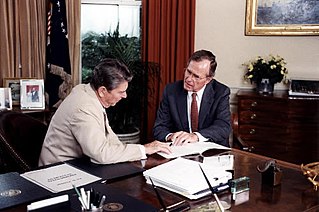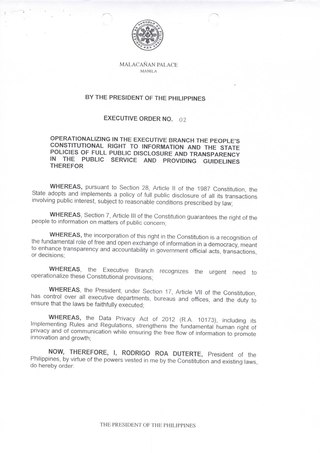Related Research Articles

The president of the United States (POTUS) is the head of state and head of government of the United States. The president directs the executive branch of the federal government and is the commander-in-chief of the United States Armed Forces.

In the United States, an executive order is a directive by the president of the United States that manages operations of the federal government. The legal or constitutional basis for executive orders has multiple sources. Article Two of the United States Constitution gives presidents broad executive and enforcement authority to use their discretion to determine how to enforce the law or to otherwise manage the resources and staff of the federal government's executive branch. The ability to make such orders is also based on expressed or implied Acts of Congress that delegate to the president some degree of discretionary power. The vast majority of executive orders are proposed by federal agencies before being issued by the president.
Executive privilege is the right of the president of the United States and other members of the executive branch to maintain confidential communications under certain circumstances within the executive branch and to resist some subpoenas and other oversight by the legislative and judicial branches of government in pursuit of particular information or personnel relating to those confidential communications. The right comes into effect when revealing the information would impair governmental functions. Neither executive privilege nor the oversight power of Congress is explicitly mentioned in the United States Constitution. However, the Supreme Court of the United States has ruled that executive privilege and congressional oversight each are a consequence of the doctrine of the separation of powers, derived from the supremacy of each branch in its area of constitutional activity.

The Freedom of Information Act, 5 U.S.C. § 552, is the United States federal freedom of information law that requires the full or partial disclosure of previously unreleased or uncirculated information and documents controlled by the U.S. government upon request. The act defines agency records subject to disclosure, outlines mandatory disclosure procedures, and includes nine exemptions that define categories of information not subject to disclosure. The act was intended to make U.S. government agencies' functions more transparent so that the American public could more easily identify problems in government functioning and put pressure on Congress, agency officials, and the president to address them. The FOIA has been changed repeatedly by both the legislative and executive branches.

Donald Joseph Albosta was an American farmer, businessman, and politician from the U.S. state of Michigan. He served three terms in the United States House of Representatives from 1979 to 1985.

Alberto R. Gonzales is an American lawyer who served as the 80th United States Attorney General from 2005 to 2007 and was the highest-ranking Hispanic American in executive government in American history until the appointment of Marco Rubio as Secretary of State in 2025. He previously served as Secretary of State of Texas, as a Texas Supreme Court Justice, and as White House Counsel, becoming the first Hispanic to hold that office.

The White House counsel is a senior staff appointee of the president of the United States whose role is to advise the president on all legal issues concerning the president and their administration. The White House counsel also oversees the Office of White House Counsel, a team of lawyers and support staff who provide legal guidance for the president and the White House Office. At least when White House counsel is advising the president on legal matters pertaining to the duties or prerogatives of the president, this office is also called Counsel to the President.

Executive Order 13233 limited access to the records of former United States Presidents to a higher degree than the previous Order 12667, which it superseded. It was drafted by then White House Counsel Alberto Gonzales and issued by George W. Bush on November 1, 2001. Section 13 of Order 13233 revoked Executive Order 12667, which was issued by Ronald Reagan on January 18, 1989.

David Spears Addington is an American lawyer who was legal counsel (2001–2005) and chief of staff (2005–2009) to Vice President Dick Cheney. He was the vice president of domestic and economic policy studies at The Heritage Foundation from 2010 to 2016.

A signing statement is a written pronouncement issued by the President of the United States upon the signing of a bill into law. They are usually printed in the Federal Register's Compilation of Presidential Documents and the United States Code Congressional and Administrative News (USCCAN). The statements offer the president's view of the law or laws created by the bill.

The Presidential Records Act (PRA) of 1978, 44 U.S.C. §§ 2201–2209, is an Act of the United States Congress governing the official records of Presidents and Vice Presidents created or received after January 20, 1981, and mandating the preservation of all presidential records. Enacted November 4, 1978, the PRA changed the legal ownership of the President's official records from private to public, and established a new statutory structure under which Presidents must manage their records. The PRA was amended in 2014, to include the prohibition of sending electronic records through non-official accounts unless an official account is copied on the transmission, or a copy is forwarded to an official account shortly after creation.
Nixon v. General Services Administration, 433 U.S 425 (1977), is a landmark court case concerning the principle of presidential privilege and whether the public is allowed to view a President's “confidential documents”. The Presidential Recordings and Materials Preservation Act, signed into law by President Gerald Ford in 1974, ordered that the Administrator of the General Services Administration obtain President Richard Nixon’s presidential papers and tape recordings. In addition, the Act further ordered that government archivists seize these materials. These archivists would preserve the material deemed historic and return to former President Nixon the materials deemed private. Furthermore, this Act stated that material that was preserved could be used in judicial hearings and proceedings. Immediately after this Act was enacted, Richard Nixon filed a lawsuit in a federal district court claiming that the Act violated the principle of separation of powers, the principle of presidential privilege, Nixon's personal privacy, his First Amendment right of association, and further asserted that it amounted to a constitutionally prohibited Bill of Attainder.

The Presidential and Federal Records Act Amendments of 2014 is a United States federal statute which amended the Presidential Records Act and Federal Records Act. Introduced as H.R. 1233, it was signed into law by President Barack Obama on November 26, 2014.

Philippine President Rodrigo Duterte signed Executive Order No. 02, also known as the Freedom of Information (FOI) Program, on July 23, 2016, in Davao City. The executive order established the first freedom of information (FOI) Program in the Philippines covering all government offices under the Executive Branch. It requires all executive departments, agencies, bureaus, and offices to disclose public records, contracts, transactions, and any information requested by a member of the public, except for matters affecting national security and other information that falls under the inventory of exceptions issued by Executive Secretary Salvador Medialdea. The landmark order was signed two days before Duterte delivered his first State of the Nation Address and just three weeks after he assumed the presidency on June 30, 2016.

The Barr letter is a four-page letter sent on March 24, 2019, from Attorney General William Barr to leaders of the House and Senate Judiciary Committees purportedly detailing the "principal conclusions" of the Mueller report of the Special Counsel investigation led by Robert Mueller into Russian efforts to interfere in the 2016 United States presidential election, allegations of conspiracy or coordination between Donald Trump's presidential campaign and Russia, and allegations of obstruction of justice.

The Mueller report, officially titled Report On The Investigation Into Russian Interference In The 2016 Presidential Election, is the official report documenting the findings and conclusions of former Special Counsel Robert Mueller's investigation into Russian efforts to interfere in the 2016 United States presidential election, allegations of conspiracy or coordination between Donald Trump's presidential campaign and Russia, and allegations of obstruction of justice. The report was submitted to Attorney General William Barr on March 22, 2019, and a redacted version of the 448-page report was publicly released by the Department of Justice (DOJ) on April 18, 2019. It is divided into two volumes. The redactions from the report and its supporting material were placed under a temporary "protective assertion" of executive privilege by then-President Trump on May 8, 2019, preventing the material from being passed to Congress, despite earlier reassurance by Barr that Trump would not exert privilege.

The Electoral Count Act of 1887 (ECA) is a United States federal law that added to procedures set out in the Constitution of the United States for the counting of electoral votes following a presidential election. In its unamended form, it last governed at the time of the 2021 United States Electoral College vote count. The Act has since been substantially amended by the Electoral Count Reform and Presidential Transition Improvement Act of 2022.

The Smith special counsel investigation was a special counsel investigation that was opened by U.S. Attorney General Merrick Garland on November 18, 2022, three days after Donald Trump announced his campaign for the 2024 United States presidential election. The investigation was created to continue two investigations initiated by the Justice Department (DOJ) regarding former U.S. President Donald Trump. Garland appointed Jack Smith, a longtime federal prosecutor, to lead the independent investigations. Smith was tasked with investigating Trump's role in the January 6 United States Capitol attack and Trump's mishandling of government records, including classified documents.

Donald J. Trump v. United States of America, was a lawsuit filed on August 22, 2022, by former U.S. president Donald Trump in the Southern District of Florida. He sought the appointment of a special master to review materials seized on August 8, 2022, during the FBI search of Mar-a-Lago, a part of the investigation into Donald Trump's handling of government documents.